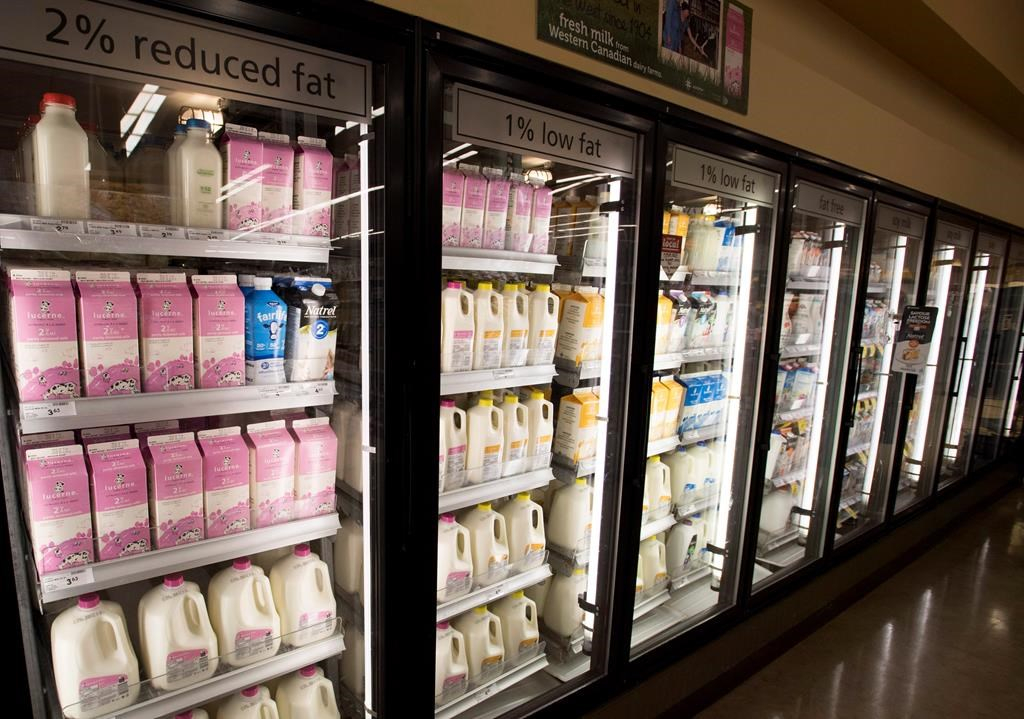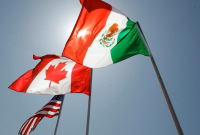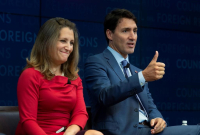Support strong Canadian climate journalism for 2025
Canadian dairy farmers have panned the renegotiated trade pact between Canada, the U.S. and Mexico, saying the new deal will undercut the industry by limiting exports and opening up the market to more American products.
Dairy Farmers of Canada issued a terse statement almost immediately after the 11th-hour agreement was announced late Sunday, following 14 months of difficult negotiations between the parties.
The organization said the newly minted U.S.-Mexico-Canada Trade Agreement, or USMCA, will grant an expanded 3.6 per cent market access to the domestic dairy market and eliminate competitive dairy classes, which the group says will shrink the Canadian industry.
It said the measures will have "a dramatic impact not only for dairy farmers but for the whole sector."
"This has happened, despite assurances that our government would not sign a bad deal for Canadians," Pierre Lampron, president of Dairy Farmers Canada, said in the statement. "We fail to see how this deal can be good for the 220,000 Canadian families that depend on dairy for their livelihood."
U.S. administration officials said the deal provides increased access to Canada's dairy market for U.S. producers and limits the American impact of Canada's controversial supply management system for dairy and poultry products.
Prime Minister Justin Trudeau would only say it was a "good day for Canada" as he left a late-night cabinet meeting in Ottawa that capped several days of frenetic long-distance talks that included Foreign Affairs Minister Chrystia Freeland and U.S. Ambassador David MacNaughton.
U.S President Donald Trump took to Twitter early Monday to praise what he called an "historic" deal that came just before U.S. and Mexican trade authorities were set to publish their own trade agreement without Canada as a signatory.
"It is a great deal for all three countries, solves the many deficiencies and mistakes in NAFTA, greatly opens markets to our farmers and manufacturers, reduces trade barriers to the U.S. and will bring all three great nations closer together in competition with the rest of the world," he tweeted. "The USMCA is a historic transaction!"
The deal appears to preserve the key dispute-resolution provisions — Chapter 19 — which allow for independent panels to resolve disputes involving companies and governments, as well as Chapter 20, the government-to-government dispute settlement mechanism.
A side letter published along with the main text of the agreement exempts a percentage of eligible auto exports from the tariffs. A similar agreement between Mexico and the U.S. preserves duty-free access to the U.S. market for vehicles that comply with the agreement's rules of origin.
Canada fought hard to retain Chapter 19, a holdover from NAFTA that U.S. trade ambassador Robert Lighthizer worked tooth and nail to eliminate.
"USMCA will give our workers, farmers, ranchers, and businesses a high-standard trade agreement that will result in freer markets, fairer trade and robust economic growth in our region," Freeland and Lighthizer said in a joint statement.
On the matter of Section 232 tariffs, Trump's trade weapon of choice, U.S. officials told a late-night conference call with reporters that the two sides had "reached an accommodation" on the issue.
Federal cabinet ministers were summoned to a late Sunday meeting at the Prime Minister's Office near Parliament Hill, while the White House convened its own late-night trade briefing conference call just an hour before the midnight deadline.
In Ottawa, PMO officials said there would be another cabinet meeting Monday and a news conference likely as well.
The Canadian Chamber of Commerce said it was relieved that an agreement in principle had been reached. But chamber president Perrin Beatty said the details of the text needed a closer look before a final verdict could be rendered.





Comments